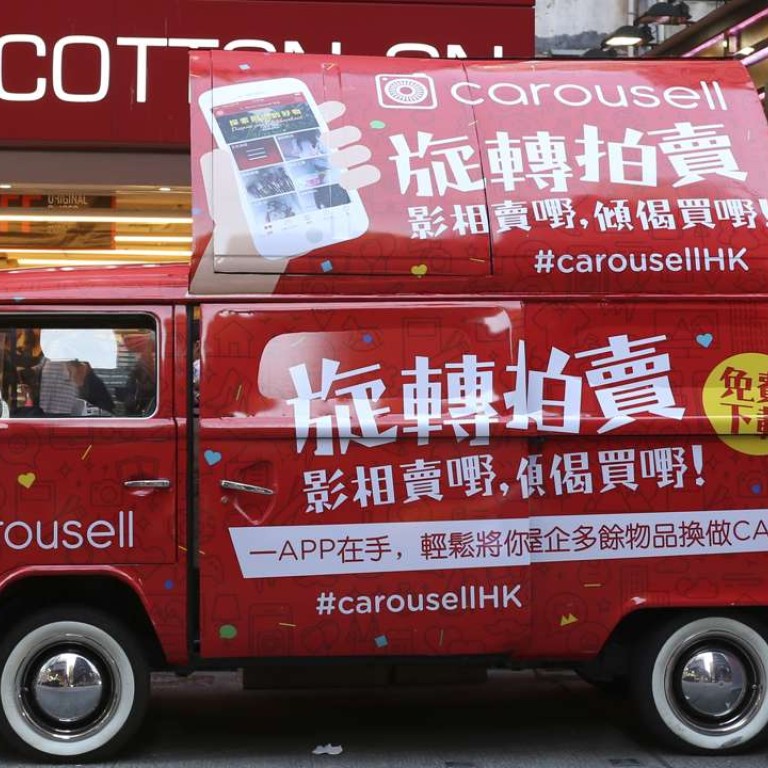
E-commerce start-ups feed Hongkongers’ passion for shopping, but are they safe?
App creators want to develop an online space for people to buy sell and exchange goods without registering or revealing credit card and personal information. Could anything go wrong?
Hongkongers love to shop and they want to shop now. That may explain the recent proliferation of mobile marketplaces, such as Milk Mart, Pinkoi and Letgo, that promise to make online shopping fun, convenient and immediate. But with this trend also come hidden pitfalls and watchdogs are warning consumers to be careful of shady sellers.
Among the latest apps to join the e-commerce market is Carousell, a Singapore start-up that has expanded to Malaysia, Taiwan, Indonesia and debuted in Hong Kong last year.
Carousell is more than a shopping app; it aims to create a community marketplace where people can sell their unused items as well as exchange goods.
“Just like Singapore, people have small homes and a lot of things. It’s a bit of a first-world problem,” says Jia Jih Chai, who oversees the company’s international expansion. “Our goal is to help people make use of the additional stuff they have in their homes.”
Unlike traditional shopping sites, users do not have to go through a lengthy sign-up process, verify their identity or input their credit card information. With Carousell, all users have to do is snap a picture of the product they want to sell, name a price and the product will be listed on Carousell.

There is also letgo, which has similar functions and features as Carousell. The US-based app was co-founded by Alec Oxenford, who also owns OLX, the largest marketplace in Brazil, India and Poland. But letgo’s performance in Hong Kong is relatively lacklustre. While some users praised the app for its innovative concept and simple interface, others complained about spam and fraudulent sellers.
And here lies the crunch: many of these shopping apps provide little in the way of legal safeguards for buyers or sellers when a deal goes wrong.
Carousell does not charge any insertion or transaction fees, nor does it act as a middleman and hold the sales transaction money; it is merely a platform for sellers to connect with potential customers. Sellers can then arrange for a meeting with the interested buyers or post them the goods. But Carousell also states in its terms of service that it is not legally liable for any disputes between users.
Francis Fong Po-kiu, chairman of the Hong Kong Association of Interactive Marketing, says there is little security when shopping on these platforms as the identity of both sellers and buyers is unknown.
“There have been many cases of fraud on Instagram in the past,” says Fong. The most common kind, he adds, is stores failing to deliver the goods after customers made payment. Unless these apps include a payment gateway, this kind of scam is hard to avoid, says Fong.
“It’s even harder to monitor these new platforms and things can get chaotic.” Since many of these platforms earn their profits through advertising and focus only on generating traffic, they will not get involved in any disputes between users, Fong explains.

However, in the case of online stores, it is very difficult to find out who is legally liable and hold them accountable.
“They close as swiftly as they’re set up,” says Wong. “If consumers did not take note of the terms and conditions of the company, it will be very difficult to find the owner of the business,” says Wong.
To better protect their rights, Wong urges consumers to steer clear of shady stores that do not list their contact information and keep a record of all the transaction details, as it will be necessary if the consumer decides to pursue legal action.
Carousell has a rating system, allowing users to rate one another after a transaction. The ratings, measured by the number of smiley or sad faces, serve as an indication of the sellers or buyers’ credibility.
Other apps have their own way of minimising scams and frauds, whether it’s a report system to file complaints or encouraging users to meet face-to-face to conduct the exchange.
With Carousell, the ease of listing an item and the chance to monetise on it prompt users to upload all sorts of stuff. Other than the most common e-commerce categories such as accessories, clothing and technological gadgets, people also sell coupons, furniture and even cars.
And some good bargains can be found among the more than one million listings. A brand new designer bag is listed for half its original price and a luxury concealer sells for HK$180 compared to the market price of HK$340.

“It started out as an experiment to explore the possibilities of concrete. Is it able to be used in furniture or is it just for construction of buildings? Can we do more with concrete?” says 23-year-old Yip.
It soon expanded into a small business as requests to make different items came rolling in.
The two creative architects have made countertop decorations for cafes, earrings, custom-made penholder and even mahjong tiles, all entirely with concrete.
Without a physical store or a webpage, the company can be found on social media and different shopping platforms. Yip simply opened a Facebook page and an Instagram account for All Goods of Concrete, and sells products on mobile marketplaces such as Carousell, Etsy, Pinkoi and Milkmart. And the best thing about this is that there are hardly any start-up costs.
“You just open an account, and the business is up and running,” says Yip.

